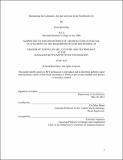Reclaiming the commons : art and activism in the neoliberal city
Author(s)
Berzofsky, Scott (Scott A.)
DownloadFull printable version (43.76Mb)
Other Contributors
Massachusetts Institute of Technology. Dept. of Architecture.
Advisor
Ute Meta Bauer.
Terms of use
Metadata
Show full item recordAbstract
How can artistic/activist practices respond to urban conditions of exclusion and inequality? Since the 1970s, urban redevelopment in the United States has been dominated by a neoliberal ideology that promotes privatization, deregulation and the withdrawal of the state from the provision of social services. As a result, urban resources such as public space, affordable housing, health care, food and education are increasingly transformed into private property. Against the neoliberal privatization of resources in the city, my work is dedicated to reclaiming public spaces and building relationships based on cooperation, solidarity and sharing resources in common. This thesis attempts to situate my practice as an artist and activist within a broader historical and theoretical framework. Part 1 defines the seemingly archaic terms "enclosure" and "the commons." Parts 2 and 3 update these terms for the twenty-first century, addressing the "new enclosures" of neoliberalism and the emergence of the alterglobalization movement. In parts 4 and 5, I describe the conditions of the neoliberal city and examine a specific case study in East Baltimore. Part 6 introduces the concept of "the right to the city." Part 7 presents an overview of my own formation as an artist and activist committed to the project of reclaiming the commons. Finally, in part 8, I reflect on the first phase of the Occupy movement and consider its potential to reconfigure the boundaries between art, politics, urbanism and everyday life.
Description
Thesis (S.M. in Art, Culture and Technology)--Massachusetts Institute of Technology, Dept. of Architecture, 2012. This electronic version was submitted by the student author. The certified thesis is available in the Institute Archives and Special Collections. "June 2012." Cataloged from student-submitted PDF version of thesis. Includes bibliographical references (p. 59-60).
Date issued
2012Department
Massachusetts Institute of Technology. Department of ArchitecturePublisher
Massachusetts Institute of Technology
Keywords
Architecture.